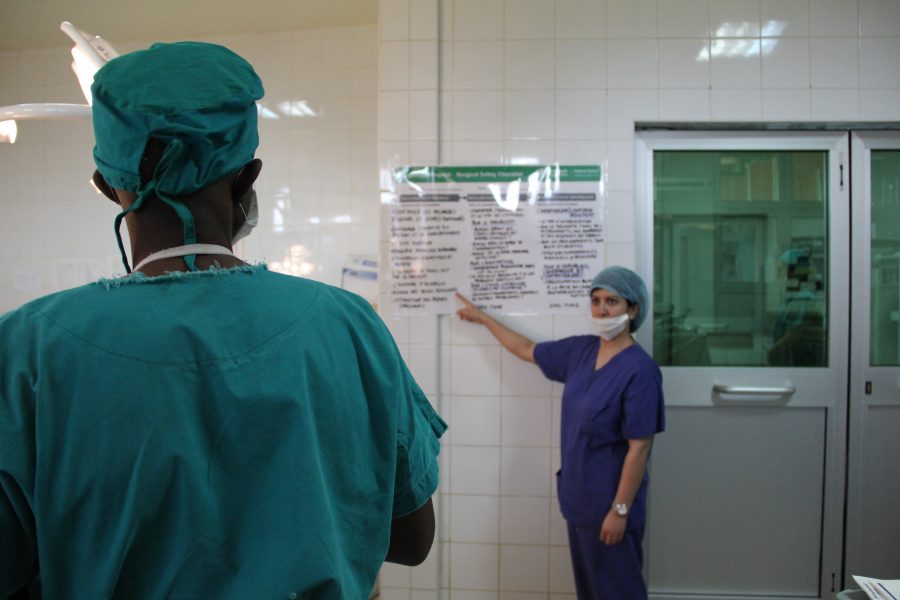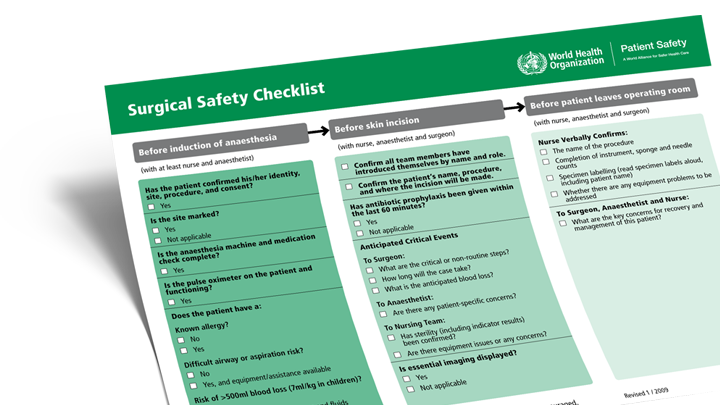“The Checklist is More Than a Sheet of Paper” — An interview with Dr. George Molina
Lifebox: Thanks for taking the time to answer these questions, Dr. Molina. Why was it important for Lifebox and Ariadne Labs to initiate a report like “Checking in on the Checklist” at this time? What did you hope to understand about Checklist use over the past decade?
Dr. George Molina: Now more than 10 years after its launch, the Checklist has become a powerful tool and symbol for improving patient safety in the operating room. It is a very recognizable tool that many surgeons, anesthesiologists, and surgical nurses would be able to identify in many parts of the world. However, despite this widespread awareness of the Checklist, it isn’t being used everywhere, for everyone, or during every surgical operation that happens throughout the world. “Checking in on the Checklist” is a celebration of the success of the Checklist, but also a reflection of its limitations and a call to keep moving forward with its implementation, adaption, and use throughout the world. With “Checking in on the Checklist” we hoped to reinvigorate interest and uptake of the Checklist around the world, and especially in low- and middle-income countries.

The WHO Surgical Safefy Checklist in use at Kibagabaga Hospital, Rwanda. Credit: Amber Lucero Dwyer/Lifebox, 2013
Lifebox: It has been over ten years since the publication of the landmark study in the New England Journal of Medicine showing the WHO Surgical Safety Checklist reduced complications and death from surgery. With the release of “Checking In On the Checklist”, what has surprised you the most about the Checklist’s impact in the past ten years?
Dr. George Molina: What has surprised me most is how it has had a positive impact in diverse parts of the world from Norway, South Carolina, Moldova, and Scotland. Also, I am amazed by the enthusiasm of the “Checklist Generation”. Surgeons who trained in the Checklist era can’t imagine ever performing an operation without using a checklist that at the minimum before starting the operation requires confirming the patient’s identity, the operation, the team members, any unexpected steps, need for blood transfusion, airway concerns, and availability of imaging. Concepts of teamwork and communication in the operating room are the norm for many surgeons in the “Checklist Generation”. I believe that this is in large part due to the Checklist, and the landmark publication in the New England Journal of Medicine now more than 10 years ago.
Lifebox: How do you hope the Checklist is used and evolves in the next decade? “Checking In On the Checklist shows” that there is certainly more work to do to improve uptake especially in low-resource contexts around the world.
Dr. George Molina: During the next 10 years I hope we are able to more fully acknowledge and embrace why the Checklist works. The Checklist is more than a sheet of paper with items to check off, it is a powerful tool that sets the tone in the operating room and normalizes basic principles of safety that include effective teamwork dynamics, active and participatory communication, and as a tool to make sure that everyone is on the same page. More importantly, the Checklist empowers everyone in the operating room to speak up on behalf of the patients’ safety. I hope we are able to use these concepts for why and how the Checklist works to convert critics of the Checklist into champions.

The WHO Surgical Safety Checklist
Lifebox: The report recommends securing buy-in, tailoring adaptation, and building accountability going forward to promote effective checklist use. What can organizations like Lifebox and Ariadne Labs, whose work is grounded in the Surgical Safety Checklist, do to support effective implementation of the Checklist?
Dr. George Molina: This is a great question, and a difficult one to answer. I think Lifebox and Ariadne Labs are outlining what is needed in order to effectively implement the checklist in the next decade, and that includes securing buy-in, tailoring adaptation, and building accountability. How to universally achieve these things is difficult at first glance since every country has different politics, national health structures, and varying degrees of available resources. However, by increasing the awareness of the power of the Checklist and by partnering with other national organizations and/or regional health organizations, Lifebox and Ariadne Labs can highlight that any endeavor to improve the delivery, quality, and equity of healthcare in a country has to include tools that promote safe surgery. One of the most important tools for promoting safe surgery, in my opinion, is the Checklist. Therefore, the Checklist must be part of national and international programs aiming to improve healthcare since surgery is a major component of the healthcare that people everywhere in the world will need during their lifetime.
George Molina, MD, MPH has assisted with Lifebox’s Checklist implementation program in Central America as made possible by the IZUMI Foundation. He is a fellow in the Complex General Surgical Oncology combined program at the Dana-Farber Cancer Institute, Brigham and Women’s Hospital, and Massachusetts General Hospital. He is also a research fellow at Ariadne Labs, a joint health systems innovation center of Brigham and Women’s Hospital and Harvard T. H. Chan School of Public Health.

